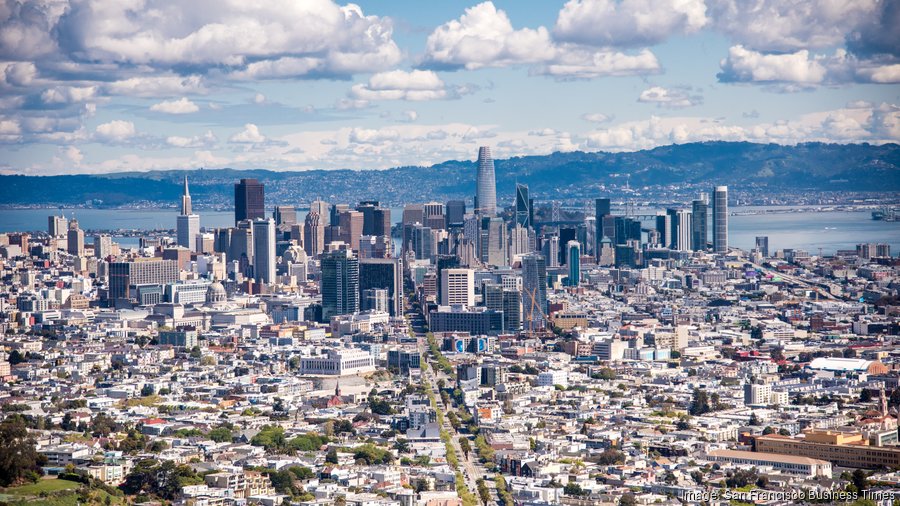Listen to this article 3 min
In the days leading up to the devastating news that Macy’s Union Square store will be closing, some of the media narrative around San Francisco struck an unexpected upbeat tone.
Yes, you had to go to London to find some positive press on San Francisco and the broader Bay Area. But business leaders took note, discussing the coverage with me during candid comments shared before senior executive interviews this month.
Granted, the Bay Area’s economic casualties continued to mount this week, with Lee’s Deli ending a 40-year run in downtown San Francisco and Chevys soon shuttering its Emeryville restaurant after long ago closing several San Francisco locations.
Perhaps things do look darkest before the dawn. The Economist took note of San Francisco's AI boom this month.
“How San Francisco staged a surprising comeback,” the magazine’s headline reads. “Forget the controversy. America’s tech capital is building the future.”
Even though the Economist notes that “across the world ‘San Francisco’ is now shorthand for a failed city,” the publication focuses on how “investors are again spending big in the Bay Area.”
Venture capital is flowing into a proliferation of AI startups that are taking advantage of the Bay Area’s deep pool of talent. Tech startup Andi, an AI-powered chat assistant, grabbed headlines last year when it moved its headquarters from Miami to downtown San Francisco to be closer to talent and investors.
The Wall Street Journal followed the Economist this month with a story that San Francisco’s AI boom is drawing investors and entrepreneurs back to the Bay Area.
During the pandemic, some took flights of fancy to far off places — Miami, Nashville and Denver, to name a few — with plans to leverage their Bay Area salaries in lower-cost markets. That may have worked at a time when companies billed themselves as “remote first” and most meetings were virtual.
That was before reality crashed the party, and the Bay Area’s power of proximity reasserted itself.
Brex is one of the startups that embraced the remote-first workplace and continues to do so. But its co-founders and co-CEOs Henrique Dubugras and Pedro Franceschi, who moved to Los Angeles, New York and Miami, came back to the Bay Area under pressure from the company’s investors to do so, the Wall Street Journal reported. And Brex didn’t mince words about its return.
“As AI continues to take the tech scene by storm, it’s imperative that we have a strong presence in San Francisco,” Brex said last summer. “San Francisco and the Bay Area continue to thrive as a hotspot for startups and founders, attracting some of the brightest minds in the industry.”
Those returning to the Bay Area, even if just part-time, include venture capitalist Keith Rabois, who became a vocal advocate for Miami’s ambitions to be the next Silicon Valley and now spends one week a month in the Bay Area, according to the Wall Street Journal, which also reported that Erik Torenberg, an investor in Scale AI and Figma, has moved from Miami to San Francisco to work on another startup.
“An ecosystem such as SF’s that has been built over the last 50-plus years doesn’t just die because of a pandemic for a few years,” Mo Koyfman, founder of New York venture firm Shine Capital, told the Wall Street Journal. Shine opened a San Francisco office in January.
Signs of the great return have been proliferating well before the global media noticed. Rents in Palo Alto, Mountain View and Cupertino soared as major tech employers called people back to the office, according to Zumper data. New homeowners in Bay Area exodus cities have been lamenting their losses as they head back to the office. One couple being uprooted from Boise expected to lose $100,000 in having to sell their Idaho home to comply with return-to-office mandates, a Redfin real estate agent said.
The debate over San Francisco and its future is sure to continue, along with dustups on social media when someone says something positive about the Bay Area.
This week, someone praising San Francisco on X after coming into town for business meetings, triggered an avalanche of comments regarding homelessness and the city’s other challenges.
“San Francisco isn’t a disaster at all,” tweeted Nick Huber. “Spent a full day of meetings there. It’s actually a great town.”
Some responded with pictures of the city’s homeless encampments and talk of safety concerns, spurring others to come to San Francisco's defense.
“Best city in the world, because it’s the only place in the entire world where 20 something year olds sleeping on couches found billion dollar companies,” one person chimed in.
A real estate investor also weighed in: “Shhhh Nick we buy a lot in that area and we need the false narrative to continue.”
San Francisco employees
| Rank | Prior Rank | Business name/Prior rank |
|---|---|---|
1 | 1 | Google |
2 | 1 | Salesforce Inc. |
3 | 3 | Apple Inc. |





